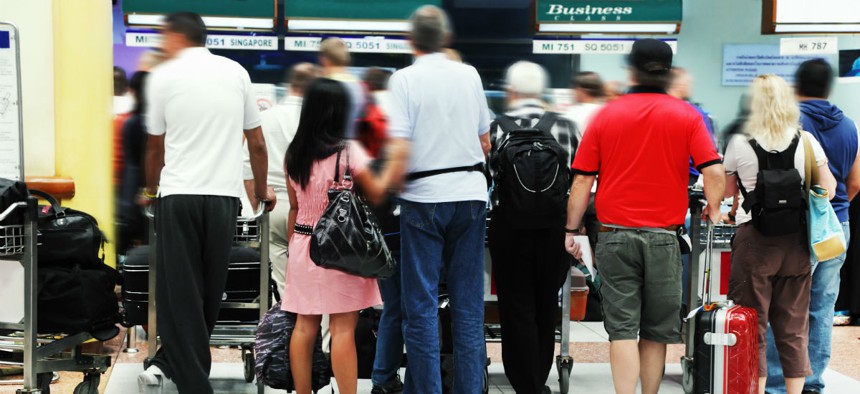
Adisa/Shutterstock.com
Public Officials, Just Remember the Airlines Are Always Worse
How not to approach customer service.
“The machine did it,” said the woman at the airline’s boarding desk.
In response, I noted that “a human programmed the machine.”
This obviously factual statement had no impact. The machine had done it. No human was responsible for causing the problem. Consequently no human was responsible for fixing the problem — for even trying to fix the problem.
If I had a problem, I needed to take it up with the machine.
Judy and I were about to embark on the third leg of a four-flight trip. The flight from Boston to Frankfort had been uneventful. But in Frankfort, when we got on the plane for Milan, we were not in adjacent seats. Indeed, we were in different rows on different sides of the plane.
This seemed a little weird. After all, we had booked our trip together, and our reservations clearly had us seated next to each other on all four legs. Being more or less normal humans, we therefore expected to be seated next to each other.
I did, however, figure out why we were not in our original seats. This flight was not fully booked and thus the airline had changed equipment. Our original seats did not exist.
Nevertheless, because the plane wasn’t full, we each sat next to an empty seat. You might have thought that the machine could figure this out and seat us together. The flight from Frankfort to Milan was, however, short. No need to complain.
When we were leaving Milan for New York, however, I was prepared. I checked our boarding passes and, once again, we were not next to each other in our originally assigned seats. Naturally, I raised this with the woman at the airline’s boarding desk.
She, however, felt no need to do anything. She didn’t even try to sound sorry. If the machine did it, that was the machine’s problem. Not hers.
Predictably the flight attendants on board the plane were more willing to do something. After all, they have to deal with the occasional irate passenger, and doing so when cooped up in a confined space is not a lot of fun. They quickly arranged for a passenger traveling alone to switch seats. No machine was involved, just normal human courtesies.
You are now going to think of me as a glutton for punishment. For just a few months later, I chose to book another flight on the very same air-line. (I did have a clear reason. This airline had multiple flights daily between Boston and my destination. Thus, if somehow I missed my flight, or my flight was canceled, I might be able to get on the next one.)
As I went through the online reservation routine, I came to the page titled: “Please complete the required information for each traveler.” I proceeded to do so.
The required information included my email address. I entered it. The machine didn’t like it. On the screen in red letters with a red box around it was the command: “Please enter a valid email address.” Since I have been using the same email address for 15 years, I thought it was pretty valid. The machine disagreed. And without the machine’s approval, hitting the “continue” icon had zero impact. The machine would not allow me to continue.
I called the 800 number and was immediately informed that my call would cost me $25, which seemed a little steep for a discussion about the validity of my email address.
I talked with a machine that connected me with a human, who connected me with a second human (who sounded like she was working from Mars). Then the line went dead. I called the 800 number again, learned again about the $25 charge, talked with the machine, with a human, and then with a second human who took down the information, and said I would not be charged $25. I got the ticket. Since Judy wasn’t on this flight, I didn’t care who sat in the adjacent seat.
Writing in The New Yorker, Tim Wu of Columbia Law School explains that the many inconveniences imposed on passengers by the airlines are not mistakes. They are conscious decisions. The airlines “want to make you suffer.” Wu calls it “calculated misery.”
The objective is to get passengers to pay more fees. “Basic service,” Wu writes “must be sufficiently degraded in order to make people want to pay to escape it.”
This is exactly why, on our trip to Milan, Judy and I had chosen to fly first class. It did not, however, improve the service. Maybe Wu’s analysis is obsolete. Maybe the airlines have decided to make everyone suffer.
Here’s one sentence you will never hear during a political campaign debate:
I am running for president to bring my vast management experience in the airline business to help government improve its efficiency, its effectiveness and its focus on customer service.
What a great laugh line.
Robert D. Behn, a lecturer at Harvard University's John F. Kennedy School of Government, chairs the executive education programDriving Government Performance: Leadership Strategies that Produce Results. His book, The PerformanceStat Potential, was recently published by Brookings. (Copyright 2015 Robert D. Behn)
(Image via Adisa/Shutterstock.com)






